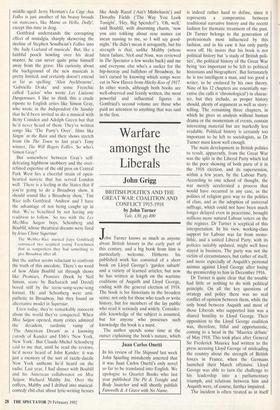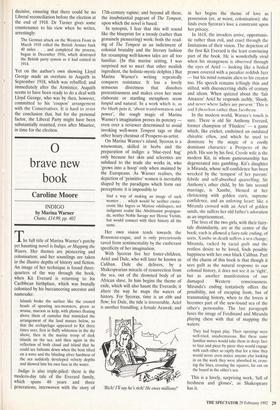Warfare amongst the Liberals
John Grigg
BRITISH POLITICS AND THE GREAT WAR: COALITION AND CONFLICT 1915-1918 by John Turner
Yale, £30, pp.400
John Turner knows as much as anyone about British history in the early part of this century, and a big book from him is particularly welcome. Hitherto his published work has consisted of a short book on Lloyd George's 'garden suburb' and a variety of learned articles; but now he has written at length on the wartime coalitions of Asquith and Lloyd George, ending with the general election of 1918. The book is for historians in the broadest sense; not only for those who teach or write history, but for members of the lay public who read it seriously and widely. Consider- able knowledge of the subject is assumed, but for anyone who possesses such knowledge the book is a must.
The author spends some time at the outset explaining the book's nature, which is indeed rather hard to define, since it represents a compromise between traditional narrative history and the recent fashion for thematic treatment of the past. Dr Turner belongs to the generation of professionals most influenced by this fashion, and in his case it has only partly worn off. He insists that his book is not political history but 'a study of British poli- tics', the political history of the Great War being `too important to be left to political historians and biographers'. But fortunately he is too intelligent a man, and too good a writer, to be enslaved by his own theory. Nine of his 12 chapters are essentially nar- rative (he calls it 'chronological') in charac- ter, but they include, as proper history should, plenty of argument as well as story- telling. The remaining three chapters, in which he gives us analysis without human drama or the momentum of events, contain interesting material but are markedly less readable. Political history is certainly too important to be left to sociologists, as Dr Turner must know well enough.
The main development in British politics to result, apparently, from the Great War was the split in the Liberal Party which led to the poor showing of both parts of it in the 1918 election, and its supersession, within a few years, by the Labour Party. According to one school of thought, the war merely accelerated a process that would have occurred in any case, as the politics of religion gave way to the politics of class, and as the adoption of universal suffrage, which could not have been much longer delayed even in peacetime, brought millions more natural Labour voters on the the register. Dr Turner is sceptical of this interpretation. In his view, working-class support for Labour was far from mono- lithic, and a united Liberal Party, with its policies suitably updated, might well have stayed in business. The party was not the victim of circumstances, but rather of itself, and more especially of Asquith's personal animus against Lloyd George after losing the premiership to him in December 1916.
Dr Turner is quite clear that the trouble had little or nothing to do with political principle. On all the key questions of strategy and policy there was no real conflict of opinion between them, while the only bond between Asquith and most of those Liberals who supported him was a shared hostility to Lloyd George. Their opposition to the Lloyd George coalition was, therefore, fitful and opportunistic, coming to a head in the 'Maurice debate' of May, 1918. This took place after General Sir Frederick Maurice had written to the press accusing Lloyd George of misleading the country about the strength of British forces in France, when the Germans launched their March offensive. Lloyd George was able to turn the challenge to his leadership into a parliamentary triumph, and relations between him and Asquith were, of course, further impaired.
The incident is often treated as in itself decisive, ensuring that there could be no Liberal reconciliation before the election at the end of 1918. Dr Turner gives some countenance to his view when he writes, arrestingly:
The German attack on the Western Front in March 1918 rolled the British Armies back 40 miles . . . and completed the process, begun in December 1916, which destroyed the British party system as it had existed in 1914.
Yet on the author's own showing Lloyd George made an overture to Asquith in September 1918, which was rebuffed; and immediately after the Armistice, Asquith seems to have been ready to do a deal with Lloyd George, who was by then, however, committed to his 'coupon' arrangement with the Conservatives. It is hard to resist the conclusion that, but for the personal factor, the Liberal Party might have been substantially reunited, even after Maurice, in time for the election.



















































 Previous page
Previous page